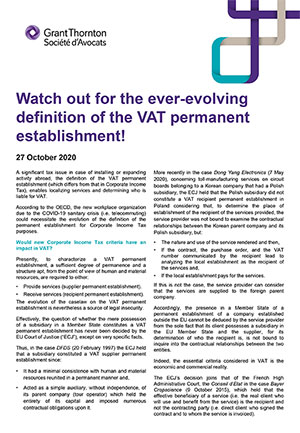-
Pilotage de la politique fiscale
Pilotage de la politique fiscale
-
Gestion de la croissance
Gestion de la croissance
-
Contrôle et contentieux fiscal
Contrôle et contentieux fiscal

-
Structuration stratégique et sécurisée des prix de transfert
Accompagnement à la définition d’une structuration stratégique et sécurisée des prix de transfert
-
Activités à l’international et Business restructuring
Accompagnement au développement des activités à l’international et aux réorganisations opérationnelles « Business restructuring »
-
Contrôles fiscaux en matière de prix de transfert
Assurer la défense des pratiques dans le cadre des contrôles fiscaux et de leur suite
-
Obligations déclaratives accrues et généralisées
Répondre aux obligations déclaratives accrues et généralisées

-
TVA domestique et internationale applicable à vos flux
TVA domestique et internationale applicable à vos flux
-
TVA bancaire et financière, TVA dans le secteur assurance
TVA bancaire et financière, TVA dans le secteur assurance
-
TVA immobilière et droits d’enregistrement (DE)
TVA immobilière et droits d’enregistrement (DE)
-
TVA dans le secteur public et associatif
TVA dans le secteur public et associatif
-
TVA, contentieux fiscal et relations avec l’Administration
Contrôle fiscal, contentieux fiscal et relations avec l’Administration fiscale
-
Règles applicables en matière de facturation
Règles applicables en matière de facturation
-
Problématiques douanières liées à vos flux internationaux
Problématiques douanières liées à vos flux internationaux
-
Obligations déclaratives et d’immatriculation à la TVA
Obligations d’immatriculation à la TVA et obligations déclaratives (TVA, DEB, DES)
-
Taxe sur les salaires
Taxe sur les salaires
-
Autres taxes indirectes
Autres taxes indirectes

-
Le Diag Transmission
Nous vous aidons à anticiper et appréhender votre opération de transmission

-
Stratégie de distribution
Mise en place et structuration de votre stratégie de distribution
-
Digitalisation des activités de distribution
Digitalisation des activités de distribution
-
Relations entre fournisseurs et distributeurs
Gérer vos relations avec vos fournisseurs et distributeurs
-
Politique contractuelle des entreprises
Mise en place et structuration de votre politique contractuelle
-
Contrôle et contentieux en matière de délais de paiement
Contrôle et contentieux en matière de délais de paiement
-
Relations commerciales avec les consommateurs
Organisation et sécurisation de vos relations commerciales avec les consommateurs
-
Droit des données personnelles - RGPD
Droit des données personnelles – conseil en RGPD
-
Baux commerciaux
Un accompagnement dans la gestion et le Contract Management des baux commerciaux.

-
Prestations traditionnelles
Prestations traditionnelles en droit social
-
Santé au travail et qualité de vie au travail
Assurer une plus grande souplesse dans l’organisation du temps de travail et améliorer la qualité de vie au travail
-
Audit du Management des Ressources Humaines
Auditer des prestations de service de la fonction RH au Groupe
-
Ingénierie RH & People Change
Mettre en place des réponses managériales en réponse aux enjeux stratégiques de l’entreprise
-
Gestion de la conformité RH et des enquêtes internes
Gestion de la conformité RH : harcèlement, discrimination et dénonciation…

-
Conseil dans la structuration juridique
Conseil dans la structuration juridique
-
Gestion courante des entreprises
Gestion courante des entreprises
-
Réorganisation d’entreprises
Réorganisation d’entreprises
-
Cession et acquisition d’entreprises
Cession et acquisition d’entreprises
-
Evolution de l’actionnariat – Emission de valeurs mobilières
Evolution de l’actionnariat – Emission de valeurs mobilières
-
Gouvernance et maîtrise des risques juridiques
Gouvernance et maîtrise des risques juridiques

-
Développement d’une politique de mobilité internationale
Développement d’une politique de mobilité internationale
-
Mobilité - Obligations déclaratives des salariés
Coordination des obligations déclaratives des salariés en situation de mobilité
-
Conseil en matière de sécurité sociale
Conseil en matière de sécurité sociale
-
Assistance en matière de droit du travail
Assistance en matière de droit du travail

-
La gestion et l’exploitation de vos portefeuilles de droits
Nous établissons avec nos clients la politique de protection de leurs droits de propriété intellectuelle la plus adaptée à leurs projets.
-
La sécurisation de vos projets : conseil et rédaction contractuelle
Conseil en matière de propriété intellectuelle, de droit de la publicité, politique contractuelle en matière de droit d’auteur et droit à l’image.
-
La défense de vos droits : précontentieux et contentieux
La défense de vos droits : détection des atteintes, précontentieux et contentieux

A significant tax issue in case of installing or expanding activity abroad, the definition of the VAT permanent establishment (which differs from that in Corporate Income Tax), enables localizing services and determining who is liable for VAT.
According to the OECD, the new workplace organization due to the COVID-19 sanitary crisis (i.e. telecommuting) could necessitate the evolution of the definition of the permanent establishment for Corporate Income Tax purposes.
Would new Corporate Income Tax criteria have an impact in VAT?
Presently, to characterize a VAT permanent establishment, a sufficient degree of permanence and a structure apt, from the point of view of human and material resources, are required to either:
- Provide services (supplier permanent establishment).
- Receive services (recipient permanent establishment).
The evolution of the caselaw on the VAT permanent establishment is nevertheless a source of legal insecurity.
Effectively, the question of whether the mere possession of a subsidiary in a Member State constitutes a VAT permanent establishment has never been decided by the EU Court of Justice (“ECJ”), except on very specific facts.
Thus, in the case DFDS (20 February 1997) the ECJ held that a subsidiary constituted a VAT supplier permanent establishment since:
- It had a minimal consistence with human and material resources reunited in a permanent manner and,
- Acted as a simple auxiliary, without independence, of its parent company (tour operator) which held the entirety of its capital and imposed numerous contractual obligations upon it.
More recently in the case Dong Yang Electronics (7 May 2020), concerning toll-manufacturing services on circuit boards belonging to a Korean company that had a Polish subsidiary, the ECJ held that the Polish subsidiary did not constitute a VAT recipient permanent establishment in Poland considering that, to determine the place of establishment of the recipient of the services provided, the service provider was not bound to examine the contractual relationships between the Korean parent company and its Polish subsidiary, but:
- The nature and use of the service rendered and then,
- If the contract, the purchase order, and the VAT number communicated by the recipient lead to analyzing the local establishment as the recipient of the services and,
- If the local establishment pays for the services.
If this is not the case, the service provider can consider that the services are supplied to the foreign parent company.
Accordingly, the presence in a Member State of a permanent establishment of a company established outside the EU cannot be deduced by the service provider from the sole fact that its client possesses a subsidiary in the EU Member State and the supplier, for its determination of who the recipient is, is not bound to inquire into the contractual relationships between the two entities.
Indeed, the essential criteria considered in VAT is the economic and commercial reality.
The ECJ’s decision joins that of the French High Administrative Court, the Conseil d’Etat in the case Bayer Cropscience (9 October 2015), which held that the effective beneficiary of a service (i.e. the real client who will use and benefit from the service) is the recipient and not the contracting party (i.e. direct client who signed the contract and to whom the service is invoiced).
Finally, this notion of VAT permanent establishment is not fixed. As proof, a question is currently pending before the ECJ in the case Titanium Ltd, C-931/19, in order to determine whether the mere passive rental of a building situated in Austria (i.e. without human resources) characterizes a VAT permanent establishment in Austria.
In this evolving context, our firm is here to help with French, as well as international, VAT permanent establishment analyses to help ensure the security of the VAT rules you apply.
Authors: Elvire Tardivon-Lorizon, Partner, Attorney-at-law, Amanda Quenette, Attorney-at-law and Cyril Cohen.
















